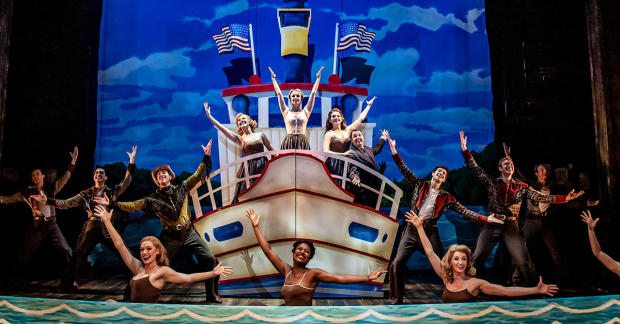
© Richard Davenport
The musical genre is so prolific and well-established that it's a welcome pleasure to see playful new versions. Kander and Ebb's Curtains refreshes the format by interpolating a whodunnit murder mystery. The scene of the crime is backstage at a struggling musical in 1959 Boston, calling upon a well-meaning detective to solve the crime while revelling in his own dreams of being a theatre star himself.
After a prolonged overture, the play opens with some dated audio-visual gags. The lead misses her cues, mistakes the backwall for the audience, and delivers lines too early – this is only short-lived, however, as she (somewhat mercifully) becomes the first murder victim. The producers then arrive reading negative reviews, bemoaning the critics who under-appreciated that they "put on a show", as if wishing to pre-emptively safeguard itself against a similar reaction.
Our guide to clarifying the truth amongst the disorienting world of backstabbing and bright lights is Lieutenant Cioffi, played by the immensely likeable comedian Jason Manford. He demonstrates his instincts as an entertainer by maintaining a consistent rapport with the audience, but he's a less naturally intuitive actor. The role requires a lot of movement as he searches for clues and stage-manages his interrogation, but his posture is fixed in a taxidermic stiffness with only his arms mobile. Coupled with his permanently worried facial expression and look of concentration, the performance feels effortful and makes Cioffi's attempts to swoon one of the suspects awkward rather than endearing. Both Manford and Ore Oduba, as one of the co-lyricists, struggle with the singing, trying to combat this by using a quivering talking voice but crucially unable to hit the big notes.
The star performer is the show's director Christopher Belling, played by Samuel Holmes who unleashes a barrage of stinging acerbic quips upon his cast. Although the character is a stereotype of the poncey, self-loving director, Holmes's performance is nonetheless wryly amusing and motivates some invaluable energy. He's the only reliable source of comedy, as elsewhere the play resorts to the slack irony of a character berating the detective for taking the law into his own hands. Rebecca Lock also manages to carve out a strong performance as the shrewd producer focused on the business of showbusiness, sidelining her own daughter to the maximisation of profits.
It's not cynical to notice the unavoidably misguided and objectionable messages of women as accessories to their male counterparts, objectifying themselves to pursue their careers. After early crude references to the murdered lead landing the role on the basis of her bust, it reaches an intolerably prurient climax in a gratuitous group number where the women repeatedly straddle the grinning men or bend over to invite the men's thrusting. It seems to cross the boundary of sensitivity with the sleazy co-producer Sidney Bernstein receiving extensive accusations of blackmailing the women into working for him.
Even setting aside these issues, the detective caper doesn't integrate well with the romantic comedy, nor do the overabundant rehearsal scenes seem to justify themselves beyond providing the opportunity for more songs and dance sequences. In the end, the moderate musical flair it offers can't offset its distasteful message. Perhaps Cioffi's solution to the series of mishaps is best: "You better make it a blackout".












